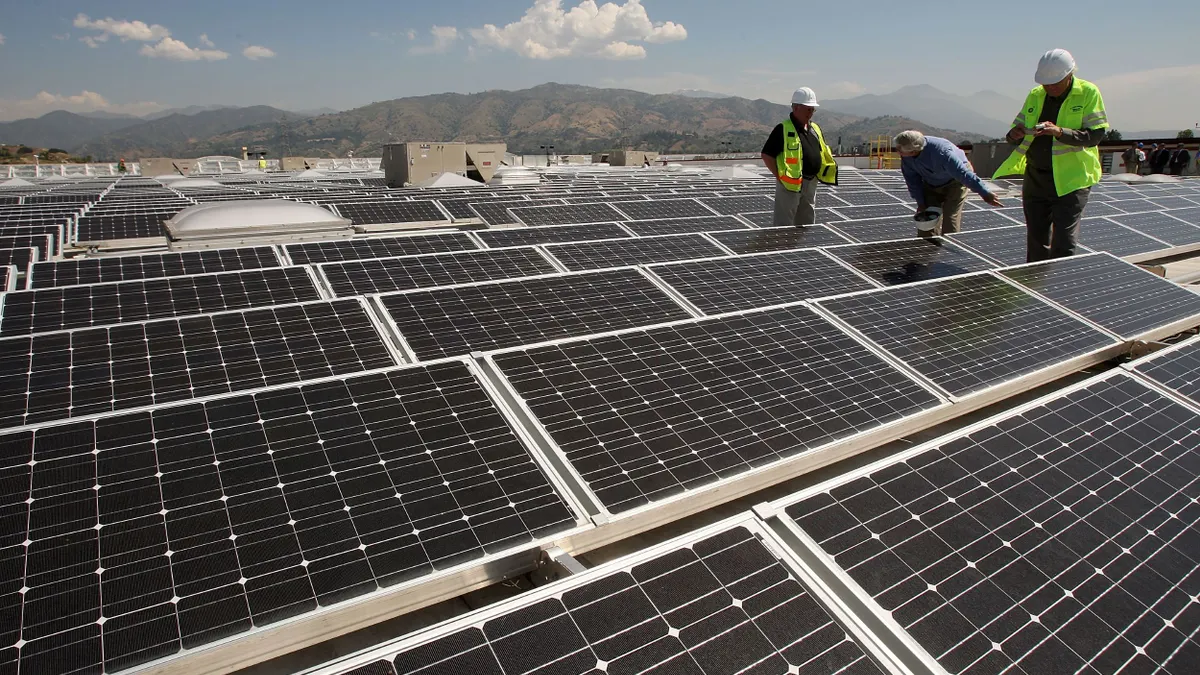Update: Congressional Republicans released the text of their final tax proposal, including incentives for electric vehicles and wind power. Utility Dive's original piece prior to that release follows.
The speed at which the Republican tax reform bill is being pushed through Congress makes it difficult to assess the details, but at this point it appears that some of the highest profile renewable energy incentives will survive the negotiating process intact.
The fate of a raft of other energy sector incentives, such as credits for biomass and geothermal power, as well as nuclear power and coal, is less certain. And there are some indications that they could be pushed aside and left for later legislative action.
Reports began to surface on Wednesday that lawmakers in Washington had emerged from conference with a deal that reconciles the House and Senate tax cut bills, though details were still scarce.
Sen. Lisa Murkowski (R-AK) on Wednesday told Utility Dive that the status of provisions that could be detrimental to renewable energy interests remain in flux, but she urged the sector not to “panic.”
As Republican leadership rushed to meet its self-imposed deadline, the focus was on high visibility issues such as the top tax rates for individuals and corporations, the deductibility of interest on mortgage debt, and the ability to deduct state and local taxes, or SALT.
Republicans lawmakers are working to bring the bill to a vote as early as next week to avoid running up against the Dec. 22 deadline for passing a continuing resolution to fund the government. They also want to take a vote before the new Democratic senator from Alabama is sworn in.
Democrat Doug Jones beat Republican Roy Moore in a special election on Tuesday, narrowing the Republican majority to one vote (51-49 from 52-48). Jones could be sworn in soon after Christmas, but that will more likely occur in early January.
By Thursday a variety of media outlets were reporting that conferees had reached agreement on some of the big issues. The highest individual tax rate would drop to 37% from 39.6%. The proposed corporate rate would be 21% instead of 20% as earlier proposed. (The current corporate tax rate is about 35%.) SALT exemptions would be retained with a $10,000 cap. The Obamacare health insurance mandate would be eliminated. And the corporate alternative minimum tax (AMT) would be eliminated.
The corporate minimum tax is a concern for renewable energy projects the are funded using tax credits because it could exclude the use of tax credits. Another area of concern for developers and investors in wind and solar projects is the Base Erosion Anti-Abuse Tax (BEAT) provision that was inserted into the Senate tax bill shortly before it was brought to a vote.
The BEAT provision would institute a method of calculating taxes that could cut the value of tax credits. The provision has been called a poison pill for the tax equity market because the value of tax credits, even existing credits, would not be known until final tax bills are tallied at the end of each year. Representatives of four renewable energy advocacy groups recently sent a letter to the Senate opposing it.
On Wednesday, Joel Cohn, a partner with law firm CohnReznick, tweeted that a BEAT fix could be in the works.
The last I heard is that businesses will be able to offset 80% of their BEAT tax with credits, and that might even improve to 85%. I understand that corporate AMT was eliminated which was another serious issue. We should see the bill over the weekend. Cheers-
— Joel Cohn (@JoelCohnCPA) December 13, 2017
The House’s tax cut bill left the PTC and ITC intact, but removed the inflation adjustment and altered the deadline for eligibility in ways that renewable energy advocates said would be devastating.
“Various sources have said the final bill will not include the House bill provision rolling back the PTC to the 1992 level for projects that start construction after the bill is enacted and will not include the House bill provision that would make it harder for projects to be considered under construction in time to qualify for tax credits,” Keith Martin, a partner with Norton Rose Fulbright, told Utility Dive via email. But he added that even key Republican senators such as Iowa’s Chuck Grassley and Alaska’s Murkowski were still saying energy tax credit provisions remained in play as of Wednesday night.
In a note to investors on Thursday, analyst Julien Dumoulin-Smith at Bank of America Merrill Lynch also predicted the PTC and ITC would remain in place on the phase out schedule that was reached in a legislative deal in 2015, but he added the caveat that “Murkowski previously indicated that they may also be addressed in a subsequent tax extenders package.”
Extenders: A package for everyone
The tax extenders package would apply to a raft of technologies that were excluded in the 2015 deal that extended the PTC and ITC but removed tax credits for fuel cells, geothermal power, microturbines, and combined heat and power plants.
The House’s tax cut bill reinstated tax credits for those “orphan” technologies, even as it undermines the value of the PTC by revising the inflation adjustment and the eligibility deadline. The House bill also would end the $7,500 tax credit for electric vehicles.
There has been some talk of the Senate support for those provisions, but Grassley, Sen. Dean Heller (R-NV) and Rob Portman (R-OH) have also raised the possibility of including credits for the orphan technologies in a separate bill before year end, possibly the must-pass government funding legislation.
Details were still unclear at press time, but there were some indications that the deal coming out of conference could extend the orphan credits retroactively by one year and forward for one year. Industry sources say that compromise would not have an immediate positive effect on the affected industries because most have already made their sales for 2018.
The possibility of a separate tax credit extender bill has attracted a range of lobbyists eager to add their projects to the list of credits to extend or to even to create. The coal industry is looking to create a tax credit for existing coal fired plants. The nuclear power industry is also looking for a 30% investment tax credit for nuclear plants, as well as an extension of a PTC for nuclear power.
Axios on Dec. 4 reported that the American Coalition for Clean Coal Electricity and Exelon are trying to convince senators to include those provisions in a bill separate from the tax cut bill before year end.
Lobbyists are also seeking a reinstatement of a tax credit for the production of cellulosic ethanol and a credit for biodiesel. And oil companies and other interests want to see a tax credit for capturing and sequestering carbon dioxide renewed.
Meanwhile Republicans are keenly focused on passing a tax bill before Christmas. Observers say the thinking is among Republican lawmakers is that they need a win and they can fix the mistakes later.
Dumoulin-Smith said he expects the details not fully addressed in conference to be “hashed out in technical correction bills or during the Treasury/IRS rulemaking process beginning spring 2018.”
Underscoring the just how fluid the situation is, Sen. Marco Rubio (R-FL) on Thursday said he would oppose any tax bill that does not expand the child tax credit for low-income families. If Republicans lose two votes the vice president would have to step in to break the tie. But, as Dumoulin-Smith noted senators Susan Collins (R-ME) and Bob Corker (R-TN) remain “wild cards.”
Corker is concerned the bill would add to the national deficit. Collins is concerned about the effect the bill would have on health care.
Vice President Mike Pence, meanwhile, has delayed a scheduled trip to the Middle East until later in the week so he can be at hand if his vote is needed.





















